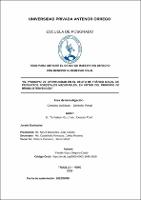Mostrar el registro sencillo del ítem
El Principio de oportunidad en el delito de tráfico ilegal de productos forestales maderables, en virtud del principio de mínima intervención
| dc.contributor.advisor | Florián Vigo, Olegario David | |
| dc.contributor.author | Tantalean Guzmán, Jonatan Pool | |
| dc.creator | Tantalean Guzmán, Jonatan Pool | |
| dc.date.accessioned | 2022-08-29T02:04:56Z | |
| dc.date.available | 2022-08-29T02:04:56Z | |
| dc.date.issued | 2022 | |
| dc.identifier.uri | https://hdl.handle.net/20.500.12759/9413 | |
| dc.description.abstract | El presente trabajo de investigación titulado “Principio de Oportunidad en el delito de Tráfico Ilegal de Productos Forestales Maderables, en virtud del Principio de Mínima Intervención”, surge a raíz del exceso que he podido visualizar, cuando se le procesa penalmente a una persona por “transportar” producto forestal en cantidades mínimas. A la fecha, sabemos que la tala ilegal de árboles y la comercialización de los mismos, se ha vuelto un problema muy concurrente en el departamento de Lambayeque, lográndose muchas veces intervenir vehículos, “transportando” grandes cantidades de producto forestal, esto es, entre 300 a 700 sacos de carbón vegetal, los mismos que a la fecha resultan sentenciados con pena privativa de libertad, pago de altas reparaciones civiles, pago de días multa, además de quedar sujetos a reglas de conductas, entre ellos la reforestación. En el mismo sentido, aquellas personas que desempeñándose como taxistas o moto taxistas y que, en su rol cotidiano de choferes y sin la mínima intención de delinquir, en el cumplimiento de sus labores accedieron a transportar entre 2 a 4 sacos de carbón vegetal, a cambio de una baja contraprestación económica, terminando posteriormente sentenciados con las mismas sanciones mencionadas en el párrafo precedente, durándoles el proceso penal entre 3 a 6 años debido a la gran carga procesal. Es así que, la presente tesis tiene como objetivo principal, aplicar el principio de oportunidad, en el delito de “tráfico ilegal de productos forestales maderables” en virtud del principio de mínima intervención del derecho penal, cuando se transporte una cantidad máxima de 04 sacos de producto forestal y el investigado no tenga calidad de reincidente | es_PE |
| dc.description.abstract | The present research work entitled ““Principle of Opportunity in the crime of Illegal Trafficking of Timber Forest Products, by virtue of the Principle of Minimum Intervention““, arises as a result of the excess that I have been able to visualize, when a person is criminally prosecuted for ““ transport” forest product in minimal quantities. To date, we know that the illegal felling of trees and their commercialization has become a very concurrent problem in the department of Lambayeque, often managing to intervene vehicles, ““transporting““ large quantities of forest product, that is, between 300 to 700 bags of charcoal, the same that to date are sentenced to imprisonment, payment of high civil reparations, payment of days fine, in addition to being subject to rules of conduct, including reforestation. In the same sense, those people who, working as taxi drivers or motorcycle taxi drivers and who, in their daily role as drivers and without the slightest intention of committing a crime, in the performance of their duties, agreed to transport between 2 to 4 sacks of charcoal, to exchange for a low economic consideration, ending later sentenced with the same sanctions mentioned in the preceding paragraph, lasting the criminal process between 3 to 6 years due to the great procedural burden. Thus, this thesis has as its main objective, to apply the principle of opportunity, in the crime of ““illegal trafficking of timber forest products““ by virtue of the principle of minimal intervention of criminal law, when a maximum quantity of 04 sacks is transported. of forest product and the person under investigation does not have the quality of a repeat ofender | en_US |
| dc.description.uri | Tesis | es_PE |
| dc.format | application/pdf | es_PE |
| dc.language.iso | spa | es_PE |
| dc.publisher | Universidad Privada Antenor Orrego. Escuela de Postgrado | es_PE |
| dc.relation.ispartofseries | M_DERE_189 | |
| dc.rights | info:eu-repo/semantics/openAccess | es_PE |
| dc.rights.uri | https://creativecommons.org/licenses/by/4.0/ | es_PE |
| dc.source | Universidad Privada Antenor Orrego - UPAO | es_PE |
| dc.source | Repositorio institucional - UPAO | es_PE |
| dc.subject | Delito | es_PE |
| dc.subject | Ilegal | es_PE |
| dc.title | El Principio de oportunidad en el delito de tráfico ilegal de productos forestales maderables, en virtud del principio de mínima intervención | es_PE |
| dc.type | info:eu-repo/semantics/masterThesis | es_PE |
| thesis.degree.grantor | Universidad Privada Antenor Orrego. Escuela de Postgrado | es_PE |
| thesis.degree.name | Maestro en Derecho Penal | es_PE |
| thesis.degree.discipline | Maestría en Derecho | es_PE |
| dc.subject.ocde | http://purl.org/pe-repo/ocde/ford#5.05.02 | es_PE |
| renati.advisor.orcid | https://orcid.org/0000-0003-1646-2819 | es_PE |
| renati.author.dni | 72720403 | |
| renati.advisor.dni | 18165036 | |
| renati.type | http://purl.org/pe-repo/renati/type#tesis | es_PE |
| renati.level | http://purl.org/pe-repo/renati/level#maestro | es_PE |
| renati.discipline | 421357 | es_PE |
| renati.juror | Neyra Barrantes, Julio Alberto | |
| renati.juror | Castañeda Ferradas, Carlos Roberto | |
| renati.juror | Rebaza Carrasco, Héctor Martín | |
| dc.publisher.country | PE | es_PE |


